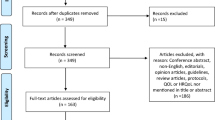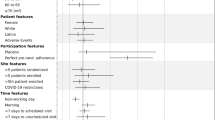Abstract
Objective
Evaluate the reliability and validity of the Medical Outcomes Study Short-Form version 2 (SF-12v2) in the 2003–2004 Medical Expenditure Panel Survey (MEPS).
Research design
Data were collected in the self-administered mail-out questionnaire and face-to-face interviews of the MEPS (n = 20,661). Internal consistency and test–retest reliability and construct, discriminate, predictive and concurrent validity were tested. The EQ-5D, perceived health and mental health questions were used to test construct and discriminate validity. Self-reported work, physical and cognitive limits tested predictive validity and number of chronic conditions assessed concurrent validity.
Results
Both Mental Component Summary Scores (MCS) and Physical Component Summary Scores (PCS) were shown to have high internal consistency reliability (α > .80). PCS showed high test–retest reliability (ICC = .78) while MCS demonstrated moderate reliability (ICC = .60). PCS had high convergent validity for EQ-5D items (except self-care) and physical health status (r > .56). MCS demonstrated moderate convergent validity on EQ-5D and mental health items (r > .38). PCS distinguish between groups with different physical and work limitations. Similarly, MCS distinguished between groups with and without cognitive limitations. The MCS and PCS showed perfect dose response when variations in scores were examined by participant’s chronic condition status.
Conclusions
Both component scores showed adequate reliability and validity with the 2003–2004 MEPS and should be suitable for use in a variety of proposes within this database.


Similar content being viewed by others
Abbreviations
- AHRQ:
-
Agency for healthcare research and quality
- ANOVA:
-
Analysis of variance
- BPN-DPN:
-
Brief pain inventory modified for patients with diabetic peripheral neuropathy
- DSM-IV:
-
Diagnostic and statistical manual of mental disorders 4th
- EQ-5D:
-
EuroQoL- 5 dimension
- ICC:
-
Intraclass correlation coefficient
- MEPS:
-
Medical expenditure panel survey
- MEPS-HC:
-
Medical expenditure panel survey household component
- MCS:
-
Mental component summary score
- NCHS:
-
National center of health statistics
- PCS:
-
Physical component summary score
- PGI:
-
Patient generated index
- SAQ:
-
Self-administered questionnaire
- SF-12v1:
-
Medical outcomes study 12-item short-form version 1
- SF-12v2:
-
Medical outcomes study 12-item short-form version 2
- SF-36:
-
Medical outcomes study 36-item short form
References
Ware, J., Kosinski, M., Turner-Bowker, D., & Gandek, B. (2002). SF12v2: How to score version 2 of the SF-12 health survey. Lincoln, RI: QualiyMetric Incorporated.
Ware, J. E., Kosinski, M., & Keller, S. D. (1996). A 12-item short-form health survey: Construction of scale and preliminary tests of reliability and validity. Medical Care, 34, 220–233. doi:10.1097/00005650-199603000-00003.
(2004) Overview of the medical expenditure panel survey, April. Agency for healthcare research and quality, Rockville, MD. Available at: http://www.meps.ahrq.gov/WhatIsMEPS/Overview.HTM#HC. Accessed January 5, 2007.
Ware, J. E., & Sherbourne, C. D. (1992). The MOS 36-item short-form health survey (SF-36).1. Conceptual framework and item selection. Medical Care, 30, 473–483. doi:10.1097/00005650-199206000-00002.
Boscarino, J. A., Adams, R. E., & Figley, C. R. (2004). Mental health service use 1-year after the World Trade Center disaster: Implications for mental health care. General Hospital Psychiatry, 26, 346–358. doi:10.1016/j.genhosppsych.2004.05.001.
Grant, B., Hasin, D., Stinson, F., et al. (2004). Prevalence correlates and disability of personality disorders in the United States: Results from the national epidemiologic survey on alcohol and related conditions. The Journal of Clinical Psychiatry, 65(7), 948–958.
Budke, C. M., Jiamin, Q., Zinsstag, J. M., et al. (2004). Use of disability adjusted life years in the estimation of disease burden of echinococcosis for a high endemic region of the Tibetan Plateau. The American Journal of Tropical Medicine and Hygiene, 71(1), 56–64.
Krupski, T. L., Fink, A., Kwan, L., et al. (2005). Health-related quality-of-life in low-income, uninsured men with prostate cancer. Journal of Health Care for the Poor and Underserved, 16, 375–390. doi:10.1353/hpu.2005.0037.
Llewellyn, C. D., McGurk, M., & Weinman, J. (2006). Health and neck cancer: To what extent can psychological factors explain differences between health-related quality of life and individual quality of life? The British Journal of Oral & Maxillofacial Surgery, 44(5), 351–357. doi:10.1016/j.bjoms.2005.06.033.
Zelman, D. C., Gore, M., Dukes, E., et al. (2005). Validation of a modified version of the Brief Pain Inventory for painful diabetic peripheral neuropathy. Journal of Vascular Nursing, 23(3), 97–104. doi:10.1016/j.jvn.2005.06.004.
Flieshman, J. A., & Zuvekas, S. H. (2007). Global self-rated mental health: Associations with other mental health measures and with role functioning. Medical Care, 45(7), 602–609. doi:10.1097/MLR.0b013e31803bb4b0.
Brooks, R. (1996). EuroQol: The current state of play. Health Policy (Amsterdam), 37, 53–72. doi:10.1016/0168-8510(96)00822-6.
Natarajan, S., & Nietert, P. (2004). Hypertension, diabetes, hypercholesterolemia, and their combinations increased health care utilization and decreased health status. Journal of Clinical Epidemiology, 57, 954–961. doi:10.1016/j.jclinepi.2004.01.011.
Cohen, J. (1988). Statistical power analysis for the behavioral sciences (2nd ed.). New Jersey: Lawrence Erlbaum.
Mosier, C. (1943). On the reliability of a weighted composite. Psychometrika, 8(3), 161–168. doi:10.1007/BF02288700.
Landis, J. R., & Koch, G. G. (1977). The measurement of observer agreement for categorical data. Biometrics, 33(1), 159–174. doi:10.2307/2529310.
Furlong, W., Barr, R., Feeny, D., et al. (2005). Patient-focused measures of functional health status and health-related quality of life in pediatric orthopedics: A case study in measurement selection. Health and Quality of Life Outcomes, 3, 3. doi:10.1186/1477-7525-3-3.
Lawrence, W. F., & Fleishman, J. A. (2004). Predicting EuroQol EQ-5D preference scores from the SF-12 Health Survey in a nationally representative sample. Medical Decision Making, 24(2), 160–169. doi:10.1177/0272989X04264015.
Saban, K. L., Penckofer, S. M., Androwich, I., & Bryant, F. (2007). Health-related quality of life of patients following selected types of lumbar spinal surgery: A pilot study. Health and Quality of Life Outcomes, 5, 71. doi:10.1186/1477-7525-5-71.
Sprangers, M. A. G., & Schwartz, C. E. (1999). Integrating response shift into health-related quality of life research: A theoretical model. Social Science & Medicine, 48(11), 1507–1515. doi:10.1016/S0277-9536(99)00045-3.
Author information
Authors and Affiliations
Corresponding author
Rights and permissions
About this article
Cite this article
Cheak-Zamora, N.C., Wyrwich, K.W. & McBride, T.D. Reliability and validity of the SF-12v2 in the medical expenditure panel survey. Qual Life Res 18, 727–735 (2009). https://doi.org/10.1007/s11136-009-9483-1
Received:
Accepted:
Published:
Issue Date:
DOI: https://doi.org/10.1007/s11136-009-9483-1




